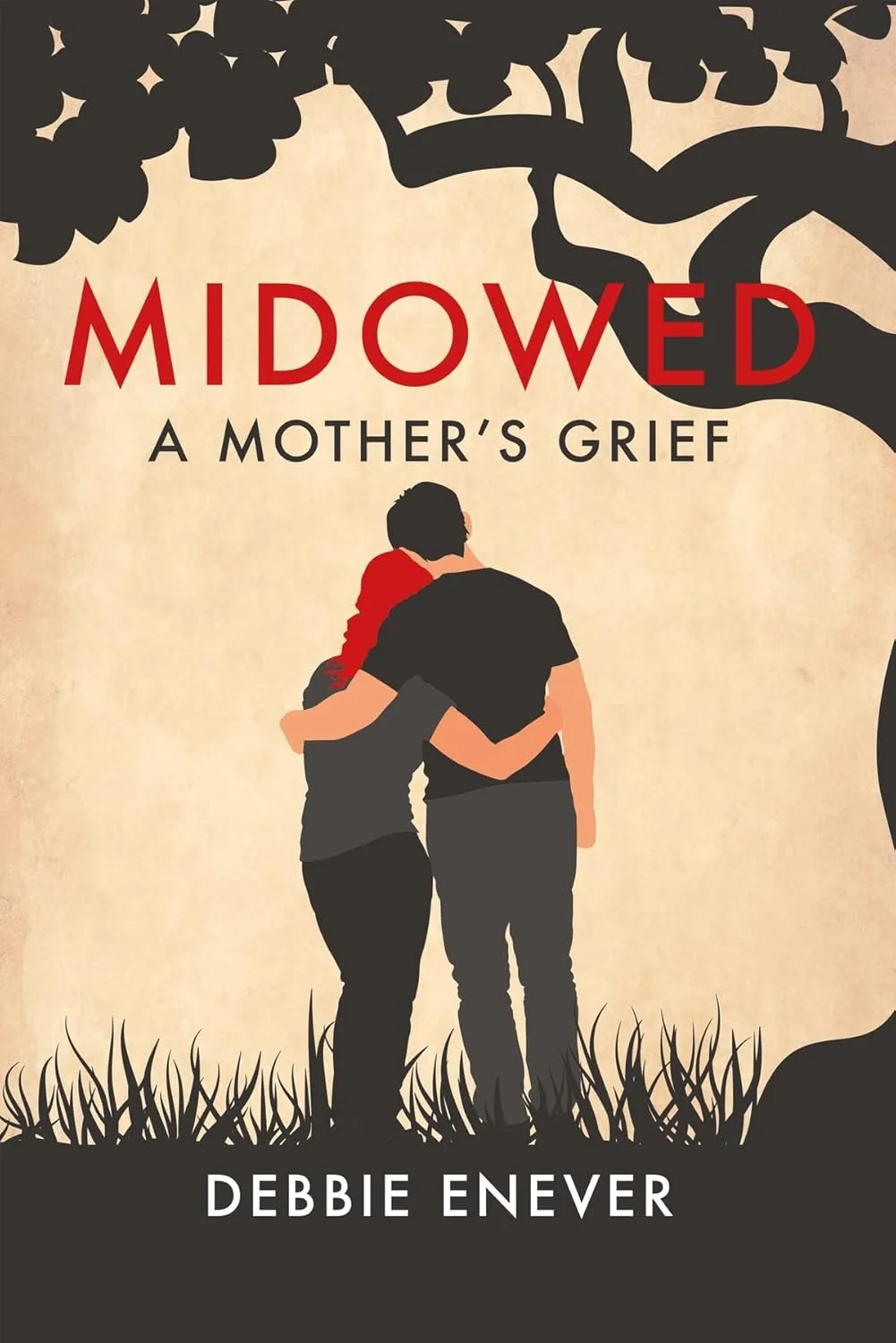
A Review of Midowed: A Mother’s Grief by Debbie Enever
Words By Haley Lawson
This title was published on April 4, 2024 by Zsa Zsa Publishing.
In the wake of her son’s death, Debbie Enever’s world as a mother is wrenched away and a new identity of “midow” takes hold. A term coined by Enever herself, a midow is a mother who has lost, or widowed, her only child. Midowed: A Mother’s Grief explores the year after Dan’s death as she navigates organ donations, funerals, holding onto memories, and finding her future.
Segmented into three parts, the novel starts on a Saturday in late May 2018 following the immediate aftermath of Dan’s accident. Faced with the terrible fact that her son has died, Enever keeps us with her at every step—the trips between hospitals, the impossible decisions, and the horror of seeing her fifteen-year-old son lying unconscious in a hospital bed. The days following his accident are documented in journal entries that intimately navigate her year of loss. We also learn about the process of organ donation while Dan’s friends and family find other ways to honor his memory.
Threaded throughout the present narrative, Enever weaves in Dan’s childhood. This choice allows readers to experience his favorite holidays; how they find their beloved dog, Maggie; and how a mother and son bond over football. And it’s Dan’s fierce love of football that propels him towards athletic ambitions. In his teenage years, he joins a gym and starts making his own high-protein meal plans. From these moments, there’s no doubt Dan’s life was full of passion. The contrast of these timelines fits together, in part, because Dan’s voice is a constant in both. While we get vivid and energetic moments in his upbringing, we also continue to hear him after his death through Enever’s personification of him. Utilizing italics, Enever allows for dialogue, opinions, and even comedic relief through Dan’s voice.
Reading this as a mid-thirties woman without children, I found myself welling up at the café as I ferociously paged through those early, dark days. Enever’s prose hones in on emotions in a way that makes them accessible to all readers. She showcases the detachment of survival that competes with the shutting down of grief.
“I’m in limbo, paused between the past and the future. Dan is in limbo, drifting between life and death. I feel like there are two of me; the puppet version of me standing, looking like a real person, and other me locked inside, with eyes closed, breath held, trying to hold onto one moment forever so nothing ever moves forward again.”
Here is the novel’s universal conflict—the perceived need to be constantly moving forward as grief grips onto us, temporarily holding us in periods of stasis. While I can’t know the loss of a child, the memoir speaks to other areas of grief I’ve experienced—having lost a loved one with no preamble and no warning. Enever’s vulnerability generates a sense of solidarity and being seen. In the year after Dan’s death, Enever deftly encapsulates the strange quality of time and solitude that follows loss.
“Minutes drag, and hours pass in a blink. I don’t want company anyway. Messages of love and support are still coming through, ping ping ping. Everyone else’s grief is hard to bear. I can’t tie up in my mind all that’s happened in the last few days. This is shock and it hums in my ears.”
Bereaved parents and those experiencing grief may relate to this sense of prostration in the wake of loss. And while I personally related to Enever’s raw openness, the novel makes no claim to be the answer to grief. In her memoir, she recognizes that friends and family manifested their grief in unique ways and she highlights the various ways to mourn. Despite their differences, however, those close to her all find small comforts in celebrating Dan’s life. That’s what this novel is at its core. A small comfort, a celebration, and a resource for fellow bereaved parents.
While there’s no denying the heartbreak in this memoir, there is also hope. Dan and Enever shared many conversations about organ donation during his life because of friends who needed, and successfully received, transplants. So, when the time comes to decide, Enever knows she isn’t deciding for Dan, but rather, ensuring his resolution to donate is fulfilled. She expresses this to the doctors to which Dan’s voice replies, Dead right, Mum. When Enever is allowed to enter his room prior to the procedure, she reminisces on his athletic life. Namely she reflects that instead of preparing for a bronze medal Dan’s keeping his organs healthy and preparing to pass on life. For that Enever expresses, “I’m so proud.”
There’s no mistaking this is Enever’s journey, but Dan is a main character, too. During her first year of grief, each chapter is labeled by the days since the accident. In contrast, when we experience Dan’s life, the chapter headings highlight the people, places, and events they experienced together. It’s these past chapters where Dan’s voice brings comic relief and comfort. In this way, the novel’s structure allows the reader to dwell in the darkest moments before being pulled into the bright joy of Dan’s childhood. Through the memoir’s braided narrative, we gain an understanding of his character—how curious he was as a child, how he loved to drink milk even as a teen, his obsession with United (affectionately considered the wrong football team according to Enever), and how caring he was. “He put in the love, and it came back multiplied” and maybe that’s what we should take from this novel, a message of love, of memory, of hope.
Of how Dan’s light shines on.